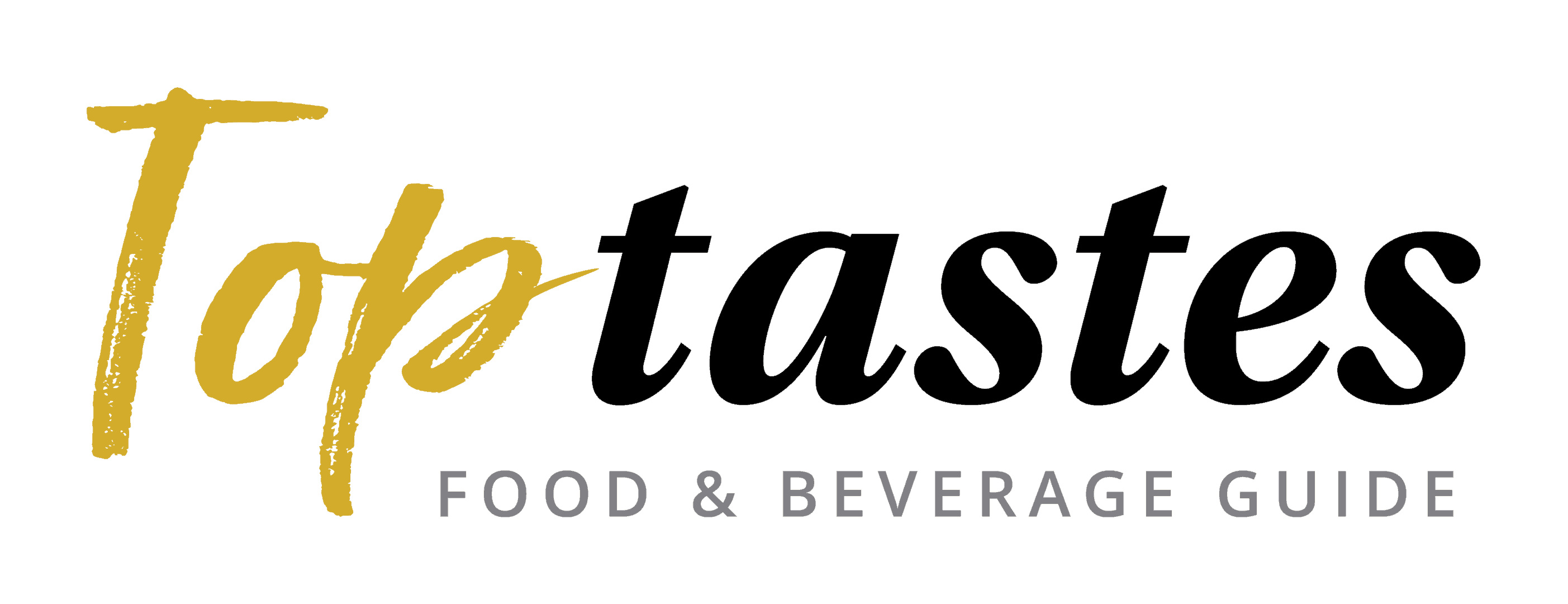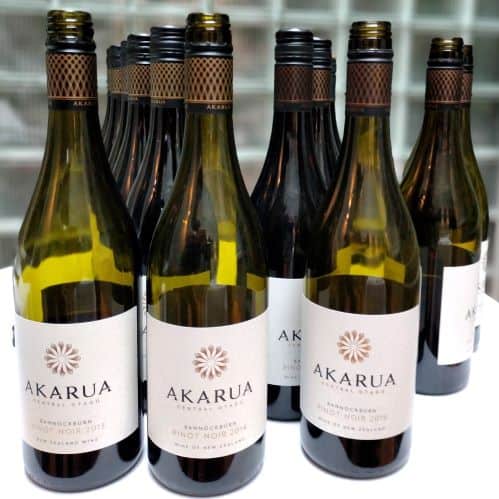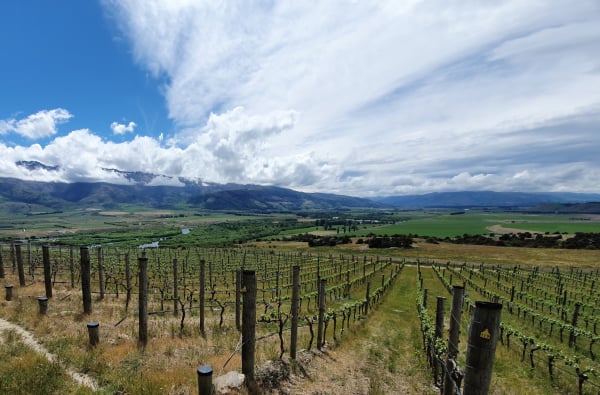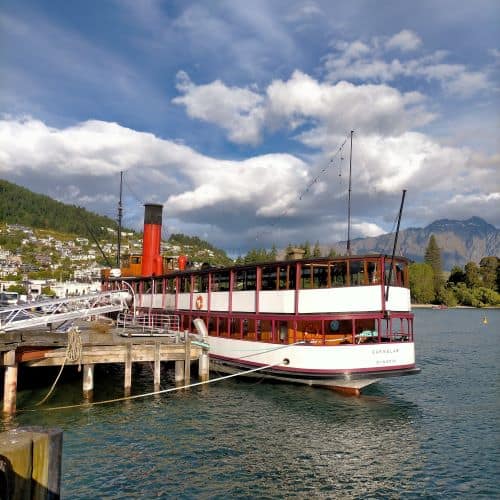
Central Otago Revisited – by Phil Parker
Over the last twenty years or so, Central Otago wine has established itself as the New Zealand Pinot Noir wine region. The area was previously better known as a winter sports playground. But now wine is a major drawcard in addition to the ruggedly beautiful alpine scenery, stunning mirrored lakes, and numerous near-death experience adrenaline sport options.
As with most overnight successes, Central Otago has been many years in the making. In fact, a Frenchman, Jean Desiré Feraud planted the first grapes in Clyde in 1864, winning a prize in an 1881 Sydney wine competition. In 1885 an Italian viticulturalist, Romeo Bragato, visited Central Otago and pronounced it “suitable for grape growing.”
But it was not ’til 1976 that the first of today’s crop of successful wineries was established. The late Rolfe Mills and his wife Lois planted their first vines at Rippon Vineyard in Wanaka. And then in 1981 Alan Brady started Gibbston Valley. Now there are over 130 wineries in the region.
For a long time, Central Otago was regarded as a marginal region for grape growing because of its long icy winters down to minus 15° C and scorching hot, plus short dry summers that can top 40° C. Marked diurnal temperature variation (day/night) means that grapes can reach physiological ripeness but retain high acid levels – giving good cellaring potential. Soil types vary from heavy clays through to wind-blown top soils over free-draining silts and schist gravels. Pinot Noir as an early-ripening red grape does very well in carefully selected north-facing slopes with free-draining rocky soils, producing full-bodied rich and complex wines. White varieties that also do well are Riesling, Pinot Gris, Chardonnay, and Gewürztraminer.
Ironically, my last visit to Central was also during another economic slump, following the Global Financial Crisis 2007/2008. My marriage had crashed about 18 months before that and my newly published Random House softback NZ regional guide, The Mad Keen Winebuff’s Road Trip, was languishing on the shelves of bookshops and wineries, as NZers tightened their belts. It is now revised and updated – and available for a modest sum on Amazon Kindle as New Zealand Wine Regions – A Visitor’s Guide. Buy now! Free steak knives! (Not really).
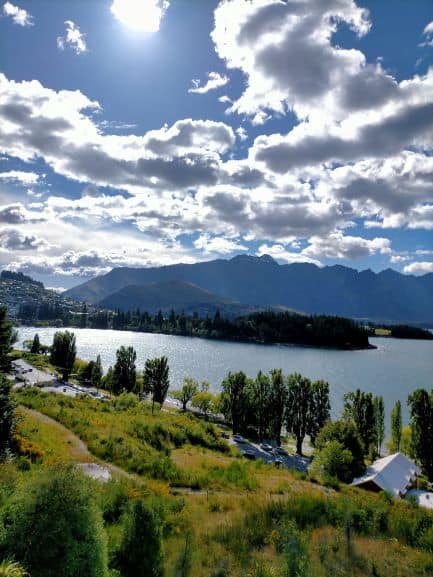
Anyway, this time we were taking a holiday as a breather after the two Auckland lockdowns, and hopefully injecting some cash into the tourist sector. Queenstown was our base, and we were lucky to stay in a fab Queenstown apartment with sweeping views of Lake Wakatipu and The Remarkables. Queenstown does get a bit of stick for being touristy and expensive, but it is drop-dead gorgeous and was formerly a magnet for cashed-up tourists from overseas who would pay a good penny for a great experience. Now, of course everything is on the back burner with (mostly North Island) tourists being the average punter. Certainly, there were a few folk in town and the bars and restaurants seemed to be doing okay. But there were quite a few For Lease signs in shop windows and a few retailers confessed that even though punters were flying in, booking accommodation, and eating out, they were not buying much.
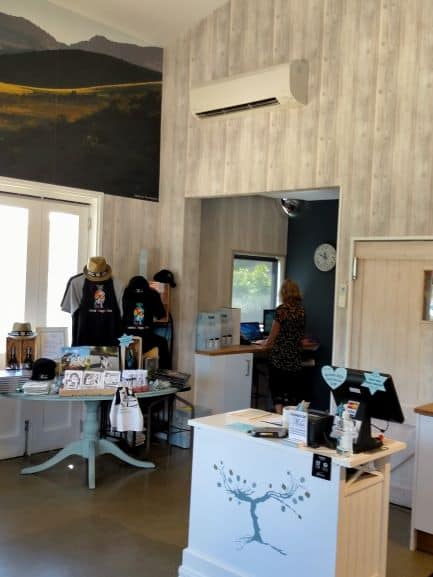
So, Next day. After the best sleep I’ve had in over a year or more, we got up and headed to Cromwell. I had a few cellar doors on my wish list, but unfortunately many were not open – for one reason or another. Anyway, we made it to Misha’s Vineyard tasting room as our first stop. In 2004, Andy & Misha Wilkinson began the operation after living in Asia for 16 years working in marketing and sales. The Asian market was well in their sights when they made their change of vocation to winemaking. They own 25 hectares of vineyards, with plans to expand. Pinot Noir is obviously the star here, but they also grow Sauvignon Blanc, Riesling and Gewürztraminer. The airy tasting room offered five tasting samples out of a choice of nine. We chose two Pinot Noirs, a Rosé, a Gewürztraminer and a Sauvignon Blanc. The Pinots were great as expected, but the surprise for me was the Sauvignon Blanc – barrel fermented and soft with floral, citrus and black currant. Also loved the ‘Soloist’ Pinot Rosé.
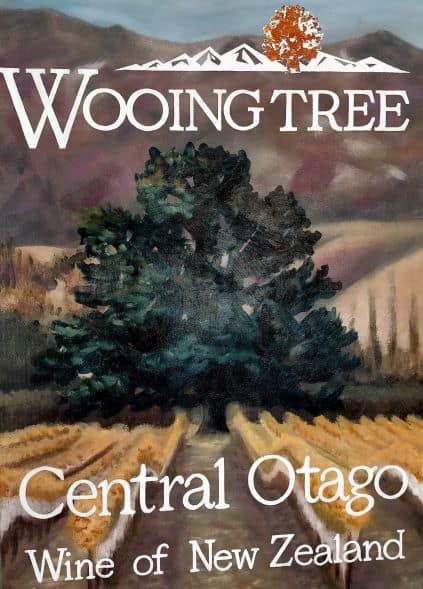 Next up was Wooing Tree. Owned by Stephen and Thea Farquharson and Stephen’s sister and brother-in-law, Jane and Geoff Bews. The label takes its name from a large pine tree, which had long been a local meeting point for lovers and the site of many a proposal to southern lasses. It is another barn-style tasting room and café, with dark brown corrugated-iron roof, exposed beams and slate floors. The focus here is almost entirely on Pinot Noir, with a small amount of Pinot Gris and Chardonnay. Their Rosé has been a runaway success. Notable wines: Chardonnay, Rosé and Sandstorm Reserve Pinot Noir.
Next up was Wooing Tree. Owned by Stephen and Thea Farquharson and Stephen’s sister and brother-in-law, Jane and Geoff Bews. The label takes its name from a large pine tree, which had long been a local meeting point for lovers and the site of many a proposal to southern lasses. It is another barn-style tasting room and café, with dark brown corrugated-iron roof, exposed beams and slate floors. The focus here is almost entirely on Pinot Noir, with a small amount of Pinot Gris and Chardonnay. Their Rosé has been a runaway success. Notable wines: Chardonnay, Rosé and Sandstorm Reserve Pinot Noir.
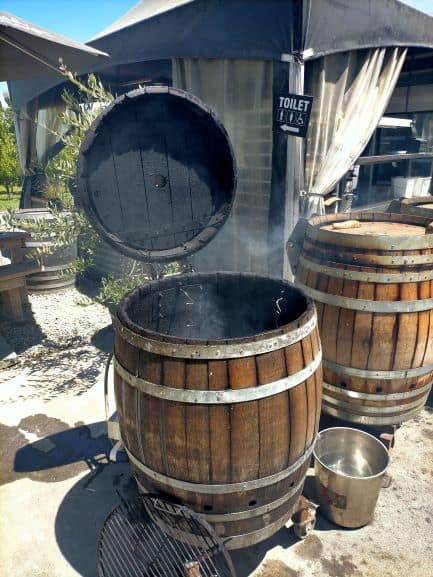
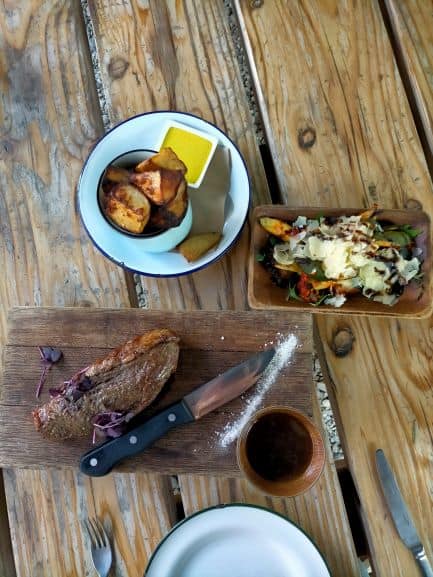
By this stage, we were getting a bit peckish, so we headed back to Cromwell village where we had a coffee that morning. There isn’t a lot of choice for lunch, but we stumbled across a wood-fired grill with very minimal advertising. Led more by the delicious wafting aroma of smoked grilled meat we discovered The Stoaker Room, where they steam, bake, grill, and smoke local foods in French oak Pinot Noir Barrels. (Adjacent to the hot smoking oak barrels is a ‘No Smoking’ sign). Once we grabbed a seat in the covered courtyard, we could see that it was well patronised by locals in the know. We opted for Wakanui Beef Rump with a side of roast potatoes with aioli, and Cajun smoked cauliflower with hummus, chimichurri and honey roasted cashews. Fantastic. Plenty enough for two people and washed down with a local Otago Brew School Ultravox11 Vienna Lager.
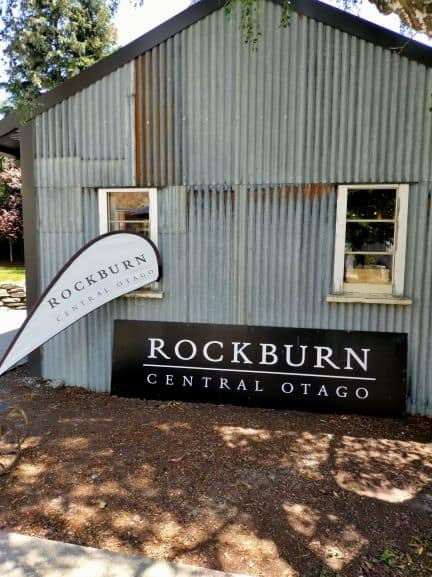 Thus fortified, we headed back towards Gibbston stopping first at the Rockburn tasting room located in the Gibbston Tavern Art Gallery. On offer was as selection of award-winning Pinot Noirs as well as Sauvignon Blanc, Pinot Gris, Riesling, Rosé and Fumé Blanc. All the Pinots were knock-down fabulous: The Devil’s Staircase, the standard Rockburn Pinot, and The Chosen Single Vineyard. Of note also, The Devil’s Staircase Pinot Gris and the Tigermoth 2015 Riesling.
Thus fortified, we headed back towards Gibbston stopping first at the Rockburn tasting room located in the Gibbston Tavern Art Gallery. On offer was as selection of award-winning Pinot Noirs as well as Sauvignon Blanc, Pinot Gris, Riesling, Rosé and Fumé Blanc. All the Pinots were knock-down fabulous: The Devil’s Staircase, the standard Rockburn Pinot, and The Chosen Single Vineyard. Of note also, The Devil’s Staircase Pinot Gris and the Tigermoth 2015 Riesling.
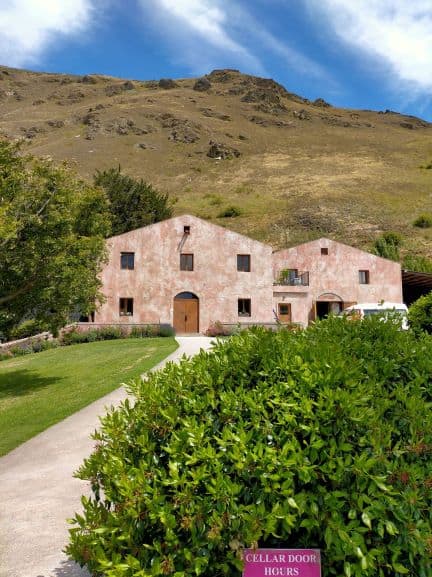 Approaching Chard Farm is not for the faint-hearted or alcohol impaired. The road is a narrow shingle goat track, which clings desperately to the slopes of the steep gorge which races down to the green Kawarau River. Brothers Rob and Greg Hay selected the sloping former orchard and market garden site (owned by a Richard Chard in the 1870s) for their vineyard and planted their first vines in 1987. Rob and his German-born wife Gerdi Schuman now oversee the winery, which continuously clocks up awards for its aromatics and Pinot Noirs. Stunningly good Pinots and a charming hostess made this a memorable tasting visit. The whole range was consistently excellent from the Sur Lie (aged under yeast) Pinot Gris, to the Riesling and four Pinot Noirs: River Run, Finla Mor, Mata-Au and finally The Tiger.
Approaching Chard Farm is not for the faint-hearted or alcohol impaired. The road is a narrow shingle goat track, which clings desperately to the slopes of the steep gorge which races down to the green Kawarau River. Brothers Rob and Greg Hay selected the sloping former orchard and market garden site (owned by a Richard Chard in the 1870s) for their vineyard and planted their first vines in 1987. Rob and his German-born wife Gerdi Schuman now oversee the winery, which continuously clocks up awards for its aromatics and Pinot Noirs. Stunningly good Pinots and a charming hostess made this a memorable tasting visit. The whole range was consistently excellent from the Sur Lie (aged under yeast) Pinot Gris, to the Riesling and four Pinot Noirs: River Run, Finla Mor, Mata-Au and finally The Tiger.
Day Two
This day, we headed out to Arrowtown for a café lunch and a snoop around the quaint historical township, Chinese Village and shops. My lovely wife found a Pounamu silver ring to replace the one that our daughter lost within 24 hours of being gifted it by her mother.
After that we took the Crown Range drive to Wanaka. Now, a lot of people recommended this as a good thing to do. And it was. But what they don’t tell you is the first part of the trip is a series of steep zig-zag switchbacks and hairpin corners for about 5 kilometres before you reach the summit. Our trusty Toyota Corolla rental managed the curves, and we were finally rewarded with magnificent views of brown alpine tussock-clad hills, with acres of multi-coloured blue, mauve and pink wild lupins nestled around the lowlands. Wanaka did strike me as much more developed than my first visit about twenty years previously with my ex-wife. It does look a lot like Taupo – with a busy township and lots of housing development spreading back from the lakeside. Of course, it still has the scenery and charm that keeps visitors returning.
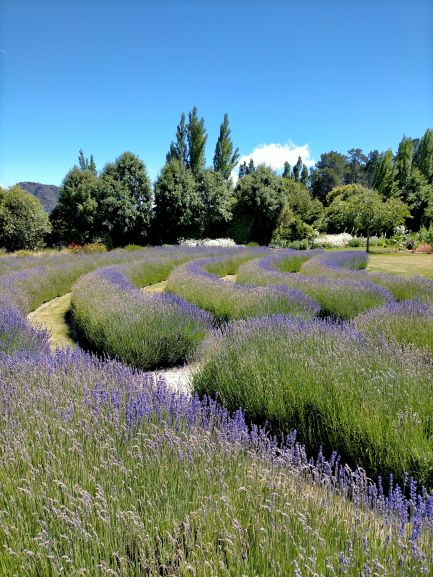
Driving back on the main road, we stumbled across the Wanaka Lavender Farm. At first sight it looks quite ordinary, but once on the property and though the gift shop, for $10 each you are free to explore picturesque acres of landscaped fragrant lavender, plus a petting zoo for kids or softy animal fans like me (donkeys, pigs, alpacas, sheep and highland cattle). The gift shop sells soaps, cosmetics and lavender honey.
One of my bucket list items for this trip was to revisit Crossfire Wanaka (formerly known as Have A Shot Wanaka). Here you have a choice of clay pigeon shooting; .22 rifle range, mini golf, a golf driving range, or archery. For just $50 you can receive a pack of 20 12-gauge cartridges plus the use of an under-and-over shotgun and get to legally shoot the living daylights out of flying orange clay targets, which look like XXOS carrot slices. Now, last time I did this, my then-wife was hugely impressed with my shooting prowess, with me hitting most of the clay birds. Who’s the Man, huh?
20 years later at 64 years old, my powers have waned. I hit three out twenty targets. “It was so cute how you just kept trying and failing. That look on your face,” said current wife. To add injury to insult, two weeks later, I still have a painful rotator cuff problem in my shoulder dating from that day. “That’s a fifteen percent success rate!” she gleefully reminded me weeks later.
Moving right along … back on the main road back to Queenstown, we dropped in at Kinross which the official cellar door for five Otago wineries – Coal Pit, Hawkshead, Kinross, Valli and Wild Irishman.
Another great tasting with a knowledgeable host. Notable wines: Hawkshead Pinot Blanc, Coal Pit Tiwha Pinot Noir (great value). Also, all the Valli range of Pinots. Stunningly good, velvety ripe wines: Valli Gibbson Vineyard Pinot Noir, Valli Bendigo Vineyard Pinot Noir , Valli Bannockburn Vineyard Pinot Noir, Valli Missy Pinot Noir, Valli Waitaki Pinot Noir.
Day Three
Today was a much anticipated visit to Akarua winery cellar door in Cairnmuir Road, Bannockburn.
(Not to be confused with the fabulous Akarua Wines & Kitchen restaurant located on the main road to Arrowtown. More on that later). Akarua was founded in Bannockburn, Central Otago in 1995 by South Island businessman and former Mayor of Dunedin, Sir Clifford Skeggs. Initially, plantings consisted of 50 hectares, with 70 percent in Pinot Noir. To keep up with demand, from 2014 Akarua began purchasing prime established vineyards at the end of Felton Road in Bannockburn and in Pisa sub-regions. A true ‘location-location’ winery, it’s located on the slopes above Lake Dunstan.
The premium Akarua Pinot Noir is the star. However, they also grow Chardonnay and Pinot Gris, and produce Rosé and a Champagne-style ‘methode’ sparkler.
Our winery visit was hosted by Zoë Ladyman, Akarua Domestic and International Sales Manager. The visit was inspired by the ‘vertical tasting’ (see previous article) hosted in Auckland this by winemaker Andrew Keenleyside and viticulturist Mark Naismith. After a tour through the winery plant, barrel hall and vineyard, we were treated to a great line up of Akarua wines. Standout wines: Pinot Gris, Akarua 25 Steps Rosé, Akarua Chardonnay, Akarua Pinot Noir, Akarua The Siren Pinot Noir.
Then – to lunch. Akarua Wines & Kitchen restaurant. I had heard great things about this restaurant, and it certainly lived up to, and exceeded expectation. On a blue-skied day in Central, we had a lovely leaf-dappled table outside. We shared the Confit half duck with apricot purée, soft herbs and duck jus. Sides: twice cooked Southland potatoes with chipotle mayo (spud heaven), and Grilled corn with cashew cream, almonds, and shredded cauliflower. A glass of the Akarua Pinot Noir was the perfect match. Wow. 5-star cuisine with a relaxed Southern charm. Highly recommended.
Day Four
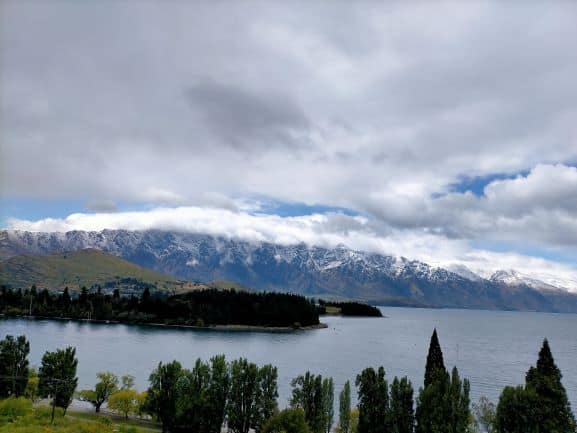
Our last day in Central Otago. We had been blessed with perfect weather for all the days since our arrival in Queenstown. The previous day it was 27 C. But overnight the temperature had plunged to 7 C and we woke to the magical sight of fresh snow on The Remarkables. The day started mildly drizzly and chilly, but by about 1 pm the snow melted, and the skies cleared.
I felt blessed. It was a last hurrah from Central Otago. “Hey, I’m beautiful in summer. But I’m gorgeous in winter too.”
I’ll be back. Deffo!
